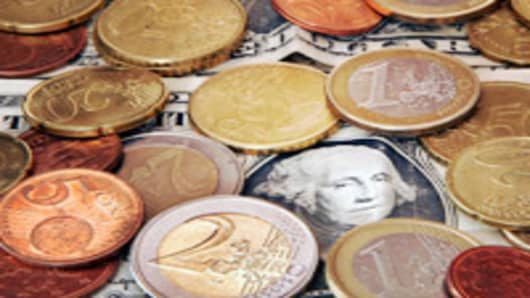The dollar vaulted higher Tuesday after major banks UBS and Lehman Brothers raised a combined $19 billion to shore up their balance sheets, boosting hopes that the worst of Wall Street's problems may be over.
UBS also wrote down an additional $19 billionin U.S. real estate and related assets, but the news boosted stock prices and the dollar on hopes that the Swiss bank has now purged its books of toxic securities. UBS said it will raise $15 billion in fresh capital through a rights issue of shares.
"It's a relief rally today," said Steven Butler, head of currency trading at Scotia Capital in Toronto. "The market is growing optimistic that the major hurdles we've all been concerned about are slowly starting to get worked through and that maybe there's light at the end of the tunnel."
The euro fell 1.1 percent to $1.5595 against the dollar, well off a record high above $1.59 set two weeks ago. Through the first three months of the year, the euro had gained 8.1 percent against the U.S. currency.
The dollar surged 2.1 percent to 101.93 yen and 2 percent against the Swiss franc to 1.0131, on track for its biggest daily gain against the franc in four years.
Lehman Brothers sold $4 billion of convertible preferred securitieson Tuesday in an effort to stave off questions about the fourth-largest U.S. investment bank's stability. After the near-collapse of Bear Stearns, then the number five U.S. investment bank, investors are sensitive to any news on large U.S. financial firms.
The euro also faced headwinds from a decline in German retail sales and a move by Spain's central bank to slash its growth forecast, which cast doubt on the view that the European Central Bank will not cut interest rates any time soon.
The ECB has held benchmark interest rates steady at 4 percent for more than two years to fight inflation. The Federal Reserve, on the other hand, has slashed rates by 3 percentage points since September, bringing its federal funds rate to 2.25 percent, the second-lowest in the developed world after Japan.
"We really had a big shift in sentiment over the last day and a half," said Boris Schlossberg, senior currency strategist at DailyFX.com. "Euro/dollar has really come down substantially and the reason is because the European data is starting to display some signs of serious slowdown."
Analysts also said the UBS writedown and news that Deutsche Bank also expects to write down $4 billionin the first quarter left traders betting that future credit problems may be more likely to emerge outside U.S. borders.
Mark Frey, head of FX trading at Custom House in Victoria, Canada, said the euro's recent rise to all-time highs means it has further to fall as the euro zone economic outlook changes.
"I don't think anyone believes we've seen the end of a U.S. slowdown, but there's been so much bad news already priced into the dollar, but not so much with the euro,'' he said.
The yen was also pressure by a Bank of Japan survey that showed business sentiment among big Japanese manufacturers sank to a four-year low.
The Aussie fell nearly 1 percent to 90.54 cents against the dollar after the country's central bank kept interest rates at a 12-year high of 7.25 percent and issued a statement that curtailed expectations of a further rate increase.
But some warned the U.S. currency may be in for renewed selling unless future data starts to paint a sunnier picture of the U.S. economy.
Earlier on Tuesday, data from the U.S. Institute for Supply Management showed continued contraction in the manufacturing sector while prices jumped to their highest since 2005.
"I don't want to sound too pessimistic, but manufacturing is in recession. The U.S. economy is still likely to experience negative growth for one or two quarters,'' said Bank of New York Mellon senior currency strategist Michael Woolfolk.
If employment data due on Friday shows the U.S. economy shed jobs for a third straight month in March, he said the dollar could fall back toward a record low against the euro.


